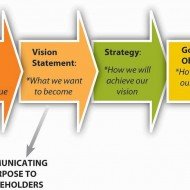Posted by Managementguru in Glossary, Strategy
on Mar 5th, 2015 | 0 comments

The following is a list of “Key Terms of #Strategic Management” which find their use often when trying to explain the concepts. #Mission An important undertaking that an organization believes it is its duty to do. A specific task or duty assigned to a person or group of people. Missions tend to be long-term and laid out in broad terms, without attempts being made to quantify them precisely. #MISSION STATEMENT Mission statement An open statement of the aims and #objectives of a business or an organization – providing employees with an indication of what they are attempting to achieve through their collective deeds. Mission statements are intended to give substance to the perceived purposes of the organization. Vision Statement A Vision Statement defines what your business will do and why it will exist tomorrow and it has defined #goals to be accomplished by a set date. A Vision Statement takes into account the current status of the organization, and serves to point the direction of where the organization wishes to go. Objective Something which an organization intends to do or achieve; a result that the organization intends to make happen. Long-term or short-term objective, which you hope to achieve within a few years or a few months. Objectives and aims tend to be medium-term and more specific in terms of what is intended to be achieved. SMART OBJECTIVES #Strategy A #plan of future action, usually long-term, in the pursuit of objectives. (e.g.) business strategy; company strategy; financial strategy. The formulation of long-term plans and policies by a firm which inter-connects its various production and marketing activities in order to achieve its business objectives. STRATEGY GENERATION #Aim A result that an organization’s plans or actions are intended to achieve. (e.g.) To try to do something: we aim to be No. 1 in the market in three years’ time. Goal An organization’s aim, objective or purpose. Goals and targets tend to be medium-term or short-term and may be expressed in terms of specific levels of achievements and tend to involve more specific quantification and deadlines. (e.g.) our goal is to break even within twelve months. GOALS VS. OBJECTIVES #Target A level or situation which an organization intends to achieve or aim at. An object or area aimed at the object of an attack or takeover bid. A fixed goal or objective, etc. #Tactics The plans followed to achieve a particular short-term aim. (a) The science and art of disposing and maneuvering forces in combat. (b) The art or skill of employing available means to accomplish an end. (c) A system or mode of procedure TACTICS OR STRATEGY? Plan A set of decisions about how an organization intends to do something, or to ensure that an event or result should happen in the future. Organized way of doing something: contingency plan, government’s economic plans. Plans tend to be quite specific (the shorter-term they are, the more specific they tend to be) and are usually quantified in some detail. They will, in order to ensure that they are complied with, lay out specific deadlines for each key stage. They may also involve the consideration or analysis of priorities and constraints. STRATEGIC PLANNING #Budget A #financial plan, which may be short-term or longer-term, showing probable (planned) #income and #expenditure. Budgets tend to be expressed mainly in monetary terms, although they may focus on the amounts of physical resources (materials, labor time) required. An estimate of income and expenditure for a future period, as opposed to an account, which records financial transactions after the event. BUDGET...

Posted by Managementguru in Financial Management, Project Management
on Feb 25th, 2014 | 0 comments

What is Budget Planning and Why is it Important? Quantification of Objectives in the form of Budgets Effective and efficient management of a business enterprise is facilitated, when a firm charts its course of action in advance. The management function also includes decision-making supported by various managerial techniques and tools that integrate the activities of the employees of the organization. One such technique is having a budget planned that which is essential for a healthy future. The systematic approach to profit planning is budgeting. The prime concern of budgeting is to make profits by regulating the flow of funds and allocating the controlling function to various responsibility centers. Don’t know how to start budget planning ? Do you need to know how to make a budget ? This infographic will provide personal budget categories you can use to help you categorize expenses for budgeting purpose. This may or will save you time, money, and effort. Getting Your Budget Approved What is a Budget? A budget is a comprehensive and coordinated financial plan, charted for a specific period of time in the future, but well in advance. It facilitates to compare the actuals with the standards established and review or revise the plans accordingly in case of any deviations or variances. A budget is a plan that is concerned not only about the resources of a firm, but also its operations. It involves the control and manipulation of relevant variables-controllable and non-controllable, and reduces the impact of uncertainty. Economic Constraints in Developing Countries Problems of unemployment, inflation and crude oil prices touching a dangerous high, these countries can offer only piecemeal measures to sustain the momentum of economic growth. Pic Courtesy: Avail Talking about organizations going for the master budget at the start of the year, it comprises budgets for various segments of the enterprise and it forms the primary step in budget planning. Master Budget The budget for a segment or department will not have much significance unless it is a part of the total budget-the master budget. If the budgets for various segments are not prepared jointly and in harmony with each other, the master budget will lose much of its importance and may even prove to be harmful in realizing the firm’s expectations. A budget is always expressed in financial terms, either in rupees, dollars or pounds, for operational purposes. Say, in a production budget, you talk about units of raw material and finished product. In a labor budget, you talk about men and labor hours. So there must be a common denominator, which can express all these variable quantities in a common language for the comprehensive budget to be meaningful. This purpose is solved by money, which undoubtedly serves as the common denominator. Budget Mechanism A budget is a mechanism to plan for the firm’s operations and activities. It allocates resources as well as responsibilities to different operational centers like, revenue, cost, profit and investment centres. Time dimension must also be added to a budget. For example, a production target of ten thousand units or a profit target of ten million dollars has no meaning unless and until it is related to a specific time period, in which these targets have to be met. A firm may have its long-range and broad objectives, such as maximum sales, maximum profits, customer satisfaction, social responsibilities, etc., But, to achieve these qualitative objectives, a firm has to quantify the same in the form of short-term objectives or goals with a time period precisely specified. A budget is basically a control technique which also facilitates to measure the performance of individuals on the basis of which, corrective action can be taken. The crux...




